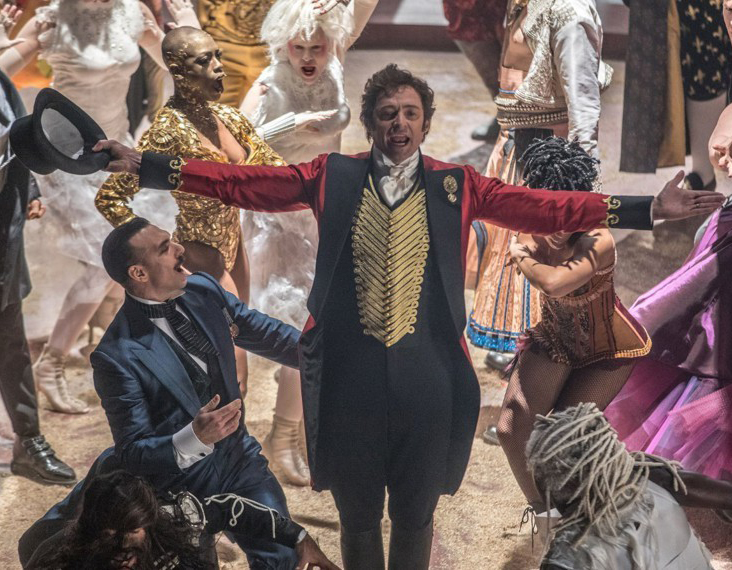‘The Greatest Showman’ fails to deliver
“The Greatest Showman” was released Dec. 8, 2017 and has since made $194.7 million in the box office. The Rotten Tomatoes critics gave the film a 54 percent approval rating, while the audience gave it 90 percent.
Jan 25, 2018
Released a mere seven months after the Barnum & Bailey Circus took its final bow after 146 years, “The Greatest Showman” serves as a timely homage to one of the most iconic and enduring traveling shows in American history.
“The Greatest Showman” focuses on the life of P.T. Barnum (Hugh Jackman), a ringleader and entrepreneur who promotes and organizes a traveling circus of acrobatic acts and oddities — all the while, inspiring a series of dazzling songs and show-stopping dance numbers.
To be sure, while the music in “The Greatest Showman” is undeniably catchy and upbeat, the songs’ messages, much like the film itself, are at times inane, hollow and altogether manipulative.
And perhaps that’s the point.
Taking a page from Barnum’s own playbook, “The Greatest Showman” is a film that takes pride in its ability to hoodwink its audience and manipulate its members with a fabricated form of entertainment.
Only this time, instead of manufactured “freaks” and illusions, it’s cheap, unabashed sentimentality.
Directing: 3/5
“The Greatest Showman” marks the directorial debut for visual effects artist Michael Gracey, whose technical acumen is on display from the outset.
Gracey employs a wide array of visual tricks to allow his sadly undeveloped story to unfold in a flashy series of intricately filmed sequences. Whether it be swooping crane shots, lateral tracking movements or elaborately executed lap dissolves, Gracey spares no expense in ensuring that “The Greatest Showman” remains a constant visual feast for the eyes.
In addition, “The Greatest Showman” boasts particularly striking choreography and cinematography that come together rather nicely during the film’s various extended musical performances.
Unfortunately, the film’s overreliance on CGI to render many of the circus’s more visually impressive acts — such as the numerous animals on display — often disrupts the viewer’s engagement with the faux reality being presented to them.
As a matter of fact, it is this false sense of reality that proves to be the film’s real downfall.
As much as Gracey attempts to mask the inherent narrative shortcomings of “The Greatest Showman” with self-indulgent editing and cinematography, the film’s flaws all too often bleed through this thinly crafted veneer.
Writing: 1/5
Simply put, the screenplay for “The Greatest Showman,” co-written by Jenny Bicks and Bill Condon, may be one of the most poorly conceived scripts to come out of a major film studio in the past decade.
Indeed, the film is riddled with clichés, contrived dialogue and a significant shortage of sufficient character development. Additionally, “The Greatest Showman” suffers from, frankly, abysmal pacing.
The film’s plot feels so rushed, in fact, that in one of the opening musical renditions, a central character inexplicably ages several decades between the song’s second and third verse.
And no, this is not an instance of a filmmaker allowing a significant period of time to elapse in order to focus in on the most salient elements of their story.
Rather, this temporal elision comes across as a lazy and hurried excuse to move on to the next rousing song and dance number.
And yet, the greatest blemish on “The Greatest Showman” remains its tendency to oversimplify and even romanticize an exploitative and abusive man.
The film’s attempts to airbrush an ugly and extremely prejudiced era of American history into an idealized fantasy aren’t merely symptoms of creative bankruptcy; they are also irresponsible oversights that should be unequivocally denounced for both their narrative carelessness and appalling backwardness.
Acting: 2/5
Although “The Greatest Showman” may be most memorable for its bubbly soundtrack and visually striking choreography, the film also offers a relatively strong cast of veteran actors and young up-and-comers.
Sadly, the cast’s collective talents are largely put to waste on the film’s shallow, one-note story.
Hugh Jackman, in particular, appears to be going through the motions throughout much of the film, as his approach to P.T. Barnum is nearly as one-dimensional as the film itself.
Ironically enough, Jackman’s acting frequently comes across as grotesquely superficial as the so-called “freaks” he so shamelessly parades around for his own monetary gain.
Zac Efron virtually plays himself as Phillip Carlyle, the playwright who partners with Barnum. Fortunately, though, Efron’s musical talents and adept footwork are often enough to distract from his severe lack of acting ability.
Michele Williams proves to be the most dynamic performer in the film, as she is able to convey a surprisingly wide range of emotions as Charity Barnum, P.T.’s forsaken wife.
Overall: 2.5/5
“The Greatest Showman” is a high-energy and enjoyably empty musical that aims for pure entertainment, rather than offering even a semblance of substance.
However, for moviegoers who are looking for a richer and more fulfilling cinematic experience, it may be best to avoid the Big Top.










Steve • May 14, 2021 at 8:17 pm
Your ability to rate movies: 2/5. The writing and plot suffer a bit but this has some of the best editing I have ever seen, and though fun is subjective this movie is fun as hell to watch.